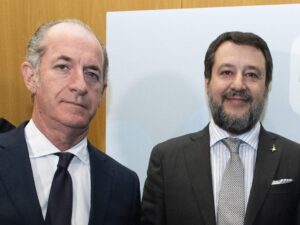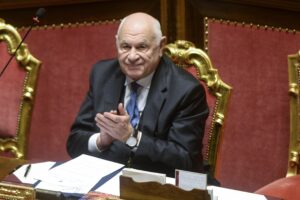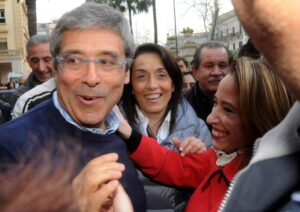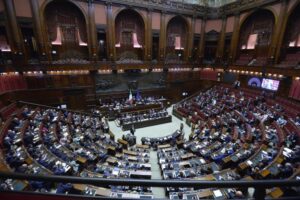Giorgio Napolitano e Gasparri: protagonisti nella storia della Repubblica Italiana

Maurizio Gasparri, durante un'iniziativa elettorale di Forza Italia in vista del voto per le regionali del Lazio, Roma, 7 febbraio 2023. ANSA/MASSIMO PERCOSSI
Giorgio Napolitano and Gasparri: They Marked the History and Life of the Republic (Photo Ansa)
Giorgio Napolitano, according to the Vice President of the Senate, Maurizio Gasparri, has made a significant impact on the history and life of the Republic. Napolitano belongs to the small group of true political figures who possess a great knowledge and extensive experience. These qualities, at times, seemed irrelevant in the face of populist movements, but in reality, they are crucial.
Gasparri and Napolitano’s Paths Crossed
“I was elected as a Member of Parliament for the first time when he was the President of the Chamber of Deputies,” recalls Gasparri. “Since then, we have had a dialectical but always sincere relationship. We encountered each other in various parliamentary and institutional roles.”
When he was Minister of the Interior, we had a heated debate regarding an attempt to downsize the special investigative units of the Police Forces and some points that were modified, at my request, in the Turkish-Napolitano immigration law.
However, the center-right also voted for him in 2013 when the Parliament was deadlocked in electing a new Head of State.
As President of the Republic, I had constant dialogue with him while serving as the parliamentary leader of the majority party.
There were often difficult and conflicting years. But I always had a direct and sincere dialogue with him.
When I returned to Parliament as a lifetime senator, he honored me with flattering words.
As proud adversaries, as he himself had said, he recognized the republican spirit with which we confronted each other in the life of democratic institutions.”
Napolitano, a Protagonist of Italian Life. A leading figure in the reformist current that sought to bring the PCI to more moderate shores
“He was a protagonist of Italian life,” continues Gasparri, “and we join in the grief of his family and those who shared with him a political experience that may have been different from mine, but was intense and important in Italian life.
To offer some critical remarks, so as not to participate in a chorus that perhaps Napolitano himself would not have liked, we cannot forget his praise for the Soviet Union’s invasion of Hungary.
But then he became a leading figure in the reformist current that sought to bring the PCI to more moderate shores.
Perhaps this cost him the opportunity to become the party’s Secretary after Berlinguer’s death because he was considered too moderate. However, it favored his election as President of the Republic, where a moderate stance was needed.
From the praise of the invasion of Hungary to leading the reformist faction, he marked, with his experience, the transformation of certain sectors of the Italian left.”
A Politics of Passion and Commitment
“Napolitano’s story was intense. We have the right to judge it from our point of view, analyzing its different phases. But it presents us with a politics of passion, commitment, culture, and meticulous attention to every single event,” says Gasparri, who concludes:
“It is a lesson that many should contemplate today, observing the qualitative degradation of contemporary times.”
European Condolences for the Passing of the President Emeritus of the Republic, Giorgio Napolitano
Condolences for the passing of the President Emeritus of the Italian Republic were also expressed in Brussels. The European flags in front of the Berlaymont building, the headquarters of the European Commission in Brussels, were flown at half-mast for the State Funeral of Giorgio Napolitano.
Secular State Funeral and National Mourning for Giorgio Napolitano
The first secular funeral for a President of the Italian Republic, a first in the history of the Republic, took place this morning at Montecitorio for the President Emeritus Giorgio Napolitano. The funeral began at around 11:30 am and ended around 1:30 pm.
The coffin, which had left Palazzo Madama at 11:20 am, was escorted by the Carabinieri at the height of Montecitorio.
Even Pope Francis went to the lying-in-state to pay his last respects to a secular President whom he appreciated for “his humanity and foresight in making important decisions in delicate moments for the life of the country,” as the Pope wrote in a telegram to the widow, Clio Napolitano.
Among those present to pay tribute to Napolitano were French President Macron, German Federal President Steinmeier, and Princess Sophie of Edinburgh, as well as representatives of European governments and the EU. The area around Montecitorio was heavily guarded, and two large screens were installed in front of the Chamber. National mourning has been declared. The body will be buried in the non-Catholic cemetery in Rome.











